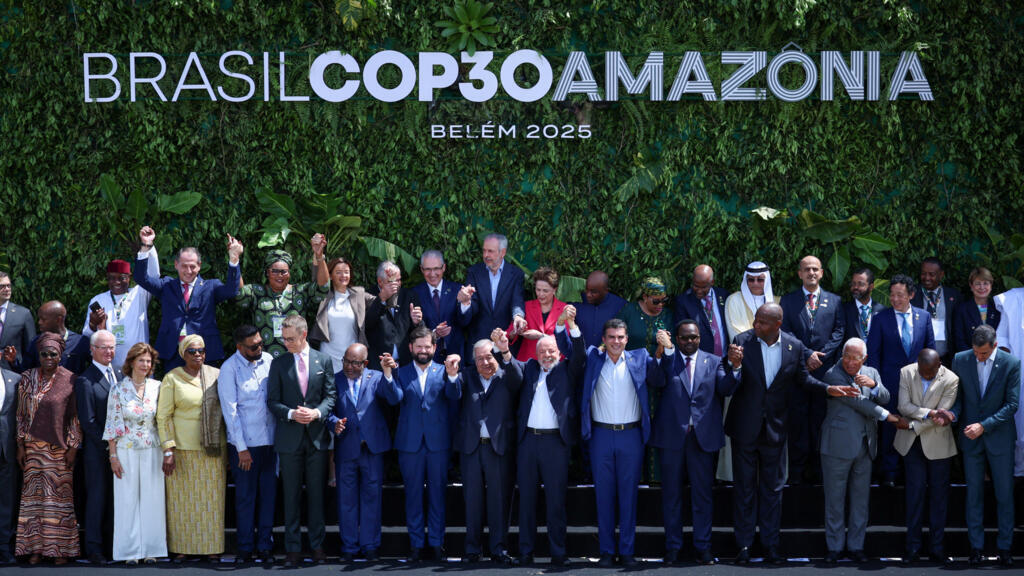From rising seas to raging floods, global leaders in Belem are confronting the human cost of climate change – and the chance to chart a fairer future.
Against the backdrop of the Amazon rainforest and a sense of urgency in the air, world leaders and delegates from across the globe have arrived in Belem for the 30th United Nations Climate Conference (Cop30).
The mood is a mix of searing warnings, cautious optimism and a touch of hope that this time, real progress might finally take root.
Before Monday’s official opening, representatives from the world’s most climate-vulnerable nations took centre stage, sharing vivid accounts of life on the front line of a warming planet. From deadly floods in Kenya to rising seas in the Marshall Islands, the message was clear: the world is running out of time, but not out of solutions.
Haitian diplomat Smith Augustin described the devastation left by Hurricane Melissa, which recently tore through his country. “The hurricanes and the heavy rain devastated my country,” he said. “Developing countries, and especially the small island states, are the least responsible for climate change.”
Kenya’s Vice President Kithure Kindiki spoke of rescuers still searching for people missing after catastrophic landslides. “A once-in-a-century cycle of droughts alternating with floods has now become common,” he said.
From the Pacific, Kalani Kaneko, foreign minister of the Marshall Islands, painted an all-too-familiar picture: “Now the sea rises, the coral dies and the fish stock leaves our shores for cooler waters.”
Officials warned that it is becoming almost impossible to keep global warming below the 1.5 degrees Celsius goal set by the 2015 Paris Agreement.
Last year was the hottest on record, and scientists say every fraction of a degree makes extreme weather worse.
“It will be much harder to ignore the Caribbean now,” said Racquel Moses, director of the Caribbean Climate-Smart Accelerator. “The very way that we live depends on these negotiations going according to plan.”
Brazil launches global fund to reward protection of rainforests
Navigating the path to a greener future
While Belem is buzzing, some notable absences have cast long shadows. US President Donald Trump, who continues to call climate change a hoax, boycotted the summit entirely.
His decision prompted a sharp rebuke from Maina Vakafua Talia, Tuvalu’s environment minister, who called Washington’s withdrawal from the Paris Agreement “a shameful disregard for the rest of the world.”
Yet other nations have stepped up. China’s Vice Premier Ding Xuexiang pledged to “accelerate the green transition in all areas,” citing massive investment in renewable energy.
Although China remains the world’s biggest carbon emitter, Ding insisted it “honours its commitments.”
India’s envoy Dinesh Bahata said renewables now make up half of India’s energy capacity. “While developing countries take decisive climate action,” he argued, “developed countries fall short.”
The African Union’s Mahmoud Ali Youssouf was equally direct: “We do not ask for charity, but for climate justice.”
Despite the heated rhetoric, Belem has already seen glimmers of progress. Two initiatives – one to protect forests and another to harmonise carbon markets – have gained traction.
Brazil’s President Luiz Inácio Lula da Silva unveiled a new rainforest protection fund designed to reward developing countries for preserving forests. On the first day alone, it attracted $5.5 billion in pledges from Norway, France and Indonesia, with Germany promising a “considerable” contribution. The aim is to grow the fund into a $125 billion lifeline for the world’s rainforests.
Finland’s President Alexander Stubb called the effort a “turn of the tide” moment. “This is happening because of financing, because of innovation,” he said. “It’s a good idea – and it works.”
Meanwhile, Brazil and the European Union announced plans to partner with China and others on a global carbon market, uniting fragmented emissions trading systems into a single framework. If successful, it would create strong economic incentives for countries and companies to cut emissions – something climate negotiators have pursued for years.
Amazon: How climate change is impacting indigenous communities
Indigenous voices at the heart of the talks
This year’s COP, held in the heart of the Amazon, is also the most inclusive yet. More than 3,000 Indigenous delegates are expected to take part – a dramatic increase from just 170 at last year’s summit in Azerbaijan.
“This time, world leaders are coming to us,” said Olivia Bisa, a leader of Peru’s Chapra nation. “We need to be in the room, not right outside of it.”
But not everyone is convinced by Brazil’s green credentials. Indigenous groups have staged protests against new oil projects and infrastructure plans that threaten their lands. On Friday, hundreds climbed cargo boats on the Tapajos River to denounce a proposed railway through Indigenous territory.
“This is our message to the leaders of the world,” said Marília Sena of the Tupinamba nation. “We’ve been here for centuries, caring for the forest and the river.”
As Cop30 gathers pace, there is a sense that something could finally shift – that amid the anger and exhaustion, the world’s climate story might yet find a hopeful outcome.
(with newswires)
